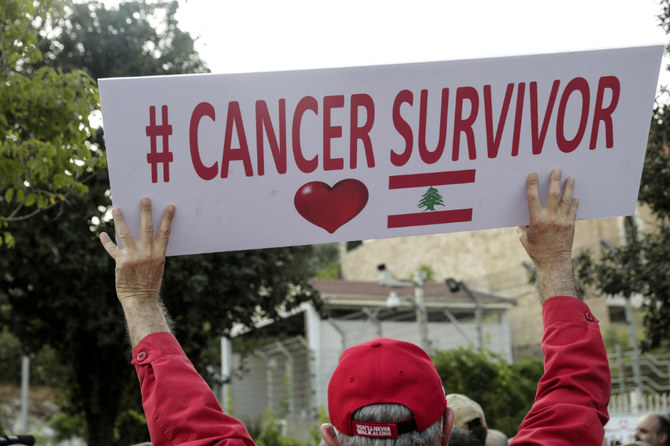Living conditions in Lebanon have deteriorated steadily since mid-2019 when the country began experiencing severe economic and financial problems, which have since been exacerbated by the COVID-19 pandemic and the 2020 Beirut port blast.
The meltdown has led to shortages of essential commodities, including fuel, and resulted in an unprecedented power crisis. Unsurprisingly, thousands of skilled Lebanese workers, notably medical professionals, have left the country and the health sector is on the brink of collapse.
Under the circumstances, Lebanon’s cancer patients are facing an uphill struggle to access even the most basic medicines and treatments, frequently having to take whatever medication is readily available regardless of the side effects.
Enter the Cancer Support Fund. Established in 2018 at the American University of Beirut Medical Center, it has given many a Lebanese in dire straits a timely and vital lifeline.
Hala Dahdah Abou Jaber, CSF’s founder and president, told Arab News the NGO was launched to specifically support Lebanon’s underprivileged adult cancer patients.
Despite the many cancer-related NGOs operating in the country, Abou Jaber says the adult demographic is often underserved, as the majority of charities are targeted at children.
“There was a necessity and an urge to help adult cancer patients, and when we say an adult, it could be a young boy who is 18 or 19, a mother who is 25 or 30, a father who is 50 years old, or simply an 80-year-old woman who also deserves a chance to live,” she said.
The extreme hardship endured by Dina Itani is a case in point. The South Lebanon resident chokes back tears as she recounts how the overlapping crises buffeting her country have disrupted her cancer treatment.
On top of fighting the disease, she and her family must also contend with chronic shortages of vital medication.
A sudden onset of eyesight deterioration about two years ago made Itani realize that something was wrong with her health. When an ophthalmologist could not find anything wrong with her eyes, he requested a brain scan, which detected a tumor.
She underwent surgery to remove the tumor, but a biopsy showed the lump was cancerous. Itani was told she would have to undergo further treatment to prevent the cancer from spreading. “I have melanoma cancer,” Itani told Arab News.
“It’s a type of skin cancer but in my case, it’s appearing in my internal organs. I underwent brain surgery in Beirut. For a year now I have been redoing diagnostic imaging every three months.”
Despite treatment, Itani’s cancer soon spread to the bone in her right arm, forcing her to undergo another surgery to install a metal plate. She was also put on a course of immunotherapy with a drug called Opdivo. “They gave me the injection every 15 days,” she said.
However, the medical subsidies allotted through Lebanon’s social security system were not enough to cover the cost of Opdivo.
According to Drugs.com, an independent medicine information website, the price of the intravenous solution ranges from $1,189 per 4ml to $7,087 per 24ml infusion in the US. Based on Lebanon’s current minimum wage, it would be almost impossible for the average household to cover such a cost.
“The CSF helps us a lot because we can’t bear the cost of this medication,” Itani said. “It’s very expensive, even for those who are financially comfortable.”
The CSF supports its patients by covering the financial costs of treatments, screenings and occasionally even transport.
“The funds received go directly to the AUB account and there is accountability. Everything we receive goes to help a needy patient,” Abou Jaber said.
The money to cover the needs of patients primarily comes from private donors, international NGOs, pharmaceutical companies, sponsors and contributors, and fundraising events.
“The number of patients supported since the establishment of the fund is 600, with more than 2,000 hospital encounters,” Dr. Ali Taher, the CSF’s co-founder, told Arab News.

